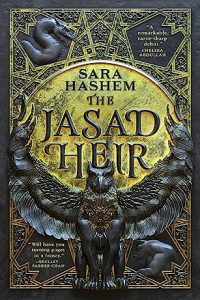A Song to Drown Rivers by Ann Liang: Review by Archita Mittra
 A Song to Drown Rivers, Ann Liang (St. Martin’s Press 978-1-25028-946-9, $32.00, 336pp, hc) October 2024.
A Song to Drown Rivers, Ann Liang (St. Martin’s Press 978-1-25028-946-9, $32.00, 336pp, hc) October 2024.
Inspired by ancient Chinese legends, A Song to Drown Rivers by Ann Liang is an intriguing historical fantasy novel that tempers the logic of trope-driven storytelling with a mature understanding of the futility of war. As a folkloric retelling of the tragic story of Xi Shi, one of the ‘‘Four Great Beauties’’ of Chinese history, Liang’s book easily sits alongside works such as Circe by Madeline Miller or The Goddess Chronicle by Natsuo Kirino, centering the tragic experiences of women as they negotiate with the patriarchal status quo, although Liang’s prose is less poetic and more straightforward than those examples – written for a mainstream audience beguiled by the promise of an angsty, slow-burn forbidden romance.
Indeed, unlike other feminist retellings of traditional tales, Liang’s novel seems to take very few creative liberties, preferring to stay as close to the source material as possible – a choice that has its strengths and, for me, flaws. Much of the novel is concerned with a carefully planned sexpionage narrative, wherein Xishi, a village girl famous for her beauty, is recruited by Goujian, the king of Yue, trained in the art of flirtation and espionage by Fanli, his military strategist, to seduce and distract Fuchai, the king of Wu, the rival state that had conquered them – paving the way for revenge and reclamation. Despite their simmering attraction, both Xishi and Fanli set aside their romantic feelings for the greater good of the kingdom – but choosing duty and sacrifice over love doesn’t quite usher in the victorious outcome they had hoped for.
In some ways, A Song to Drown Rivers echoes Xiran Jay Zhao’s Iron Widow. Like Wu Zeitan (of Iron Widow), Xishi too leaves behind her struggling, poverty-ridden life in the village, marred by raids and abductions, to ascend to a position of great political power in the rival court as Fuchai’s favored concubine. By weaponizing her beauty, Xishi successfully distracts Fuchai from military operations and directs the kingdom’s funds elsewhere, allowing Goujian to strike and take back the throne at an opportune moment. Thus, the plot progresses smoothly with very few twists, which in my opinion, takes away the ‘‘thrill’’ of a court intrigue storyline somewhat – the challenges to Xishi’s covert mission are not as threatening and are easily dispatched, though it does have its casualties. Indeed, for fans of A Game of Thrones, the plot will not keep the reader worrying if Xishi’s mask is about to slip, unlike say in Seth Dickinson’s intricately plotted The Traitor Baru Cormorant or even Sharon Shinn’s Summers at Castle Auburn, where the courtly machinations seem more complex, and the risk of failure looms in every page.
Ann Liang’s novel also reminded me of a graphic novel I’d read recently – Beauty by Hubert and Kerascoët – that also delves into the nature of women’s beauty and men’s desires, wherein a village girl is transformed into an arresting beauty as a result of a magic spell, but the consequences are disastrous. Although the comic is comparatively darker, both books explore the conceit of physical beauty being weaponized to serve a political purpose, and the illusory nature of power it confers to the possessor of said beauty. Although Xishi is a kind-hearted and endearing person, it is her magnificent beauty that prompts people to notice her virtues and renders her so valuable in the eyes of both kings. Without this genetic advantage, the patriarchal society would have no use for her – and yet after she fulfils her purpose, Goujian immediately has her removed, lest her looks tempt or corrupt anyone else, brilliantly emphasizing how all women, regardless of their physical attributes are disposable under the patriarchy. But beauty is only skin-deep, and I’d have liked Liang to have interrogated this theme further, because patriarchal beauty standards are not objective truths but extremely subjective, varying from culture to culture and generation to generation.
Xishi, Fanli, and even Fuchai are well-realized characters that the reader can sympathize with and root for, though I think the author missed a golden opportunity for a love triangle plot with these three. The forbidden romance that blooms between Xishi and Fanli continues to simmer in the background – a painful reminder of the happiness that Xishi has had to give up to bring an era of peace for her people. Indeed, though I had some issues with the book, it redeemed itself with its refreshingly tragic ending – similar to what Natsuo Kirino does so masterfully in The Goddess Chronicle – that seems to remind the reader that not all lovers are lucky or privileged enough for a happily-ever-after and that common people, lied to as a result of propaganda, become mere pawns in the wars between kings. A Song to Drown Rivers thus offers a greater closure by privileging the self-realization of the characters that comes at too great a cost in place of romantic bliss, and underscoring the seeming victory and independence of the Yue kingdom.
Overall, A Song to Drown Rivers rewarded with a mature and off-kilter ending that I do not see very often in contemporary mass-market genre fiction, and might be perfect for readers in the mood for a quick, breezy read in the vein of folkloric retellings and star-crossed love.
Interested in this title? Your purchase through the links below brings us a small amount of affiliate income and helps us keep doing all the reviews you love to read!
Archita Mittra is a writer and artist, with a fondness for dark and fantastical things She completed her B.A (2018) and M.A (2020) in English Literature from Jadavpur University and a Diploma in Multimedia and Animation from St. Xavier’s College.
When she isn’t writing speculative fiction or drawing fanart, she can be found playing indie games, making jewelry out of recycled material, reading a dark fantasy novel, baking cakes, or deciding which new Tarot deck to buy.
She lives in Kolkata, India, with her family and rabbits.
This review and more like it in the August 2024 issue of Locus.
 While you are here, please take a moment to support Locus with a one-time or recurring donation. We rely on reader donations to keep the magazine and site going, and would like to keep the site paywall free, but WE NEED YOUR FINANCIAL SUPPORT to continue quality coverage of the science fiction and fantasy field.
While you are here, please take a moment to support Locus with a one-time or recurring donation. We rely on reader donations to keep the magazine and site going, and would like to keep the site paywall free, but WE NEED YOUR FINANCIAL SUPPORT to continue quality coverage of the science fiction and fantasy field.
©Locus Magazine. Copyrighted material may not be republished without permission of LSFF.









